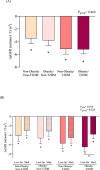Mediterranean diet as a strategy for preserving kidney function in patients with coronary heart disease with type 2 diabetes and obesity: a secondary analysis of CORDIOPREV randomized controlled trial
- PMID: 38755195
- PMCID: PMC11099022
- DOI: 10.1038/s41387-024-00285-3
Mediterranean diet as a strategy for preserving kidney function in patients with coronary heart disease with type 2 diabetes and obesity: a secondary analysis of CORDIOPREV randomized controlled trial
Erratum in
-
Correction: Mediterranean diet as a strategy for preserving kidney function in patients with coronary heart disease with type 2 diabetes and obesity: a secondary analysis of CORDIOPREV randomized controlled trial.Nutr Diabetes. 2024 Jun 12;14(1):44. doi: 10.1038/s41387-024-00304-3. Nutr Diabetes. 2024. PMID: 38866744 Free PMC article. No abstract available.
Abstract
Background: Type 2 diabetes mellitus (T2DM) is recognized an independent risk factor for chronic kidney disease (CKD). The precise contribution and differential response to treatment strategies to reduce kidney dysfunction, depending on whether obesity is present alongside T2DM or not, remain to be fully clarified. Our objective was to improve our understanding of how obesity contributes to kidney function in patients with T2DM and coronary heart disease (CHD), who are highly predisposed to CKD, to assign the most effective dietary approach to preserve kidney function.
Methods: 1002 patients with CHD and estimated glomerular filtration rate (eGFR)≥30 ml/min/1.73m2, were randomized to consume a Mediterranean diet (35% fat, 22% MUFA, < 50% carbohydrates) or a low-fat diet (28% fat, 12% MUFA, > 55% carbohydrates). Patients were classified into four groups according to the presence of T2DM and/or obesity at baseline: Non-Obesity/Non-T2DM, Obesity/Non-T2DM, Non-Obesity/T2DM and Obesity/T2DM. We evaluated kidney function using serum creatinine-based estimated glomerular filtration rate (eGFR) and urinary albumin-to-creatinine ratio (uACR) before and after 5-years of dietary intervention.
Results: Patients with Obesity/T2DM had the lowest baseline eGFR and the highest baseline uACR compared to non-diabetics (p < 0.05). After dietary intervention, the Mediterranean diet induced a lower eGFR decline in patients with Obesity/T2DM, compared to a low-fat diet but not in the other groups (p = 0.014). The Mediterranean diet, but not the low-fat diet, also reduced uACR only in patients with Obesity/T2DM (p = 0.024).
Conclusions: Obesity provided an additive effect to T2DM resulting in a more pronounced decline in kidney function compared to T2DM alone when compared to non-diabetics. In patients with concomitant presence of T2DM and obesity, with more metabolic complications, consumption of a Mediterranean diet seemed more beneficial than a low-fat diet in terms of preserving kidney function. These findings provide valuable insights for tailoring personalized lifestyle modifications in secondary prevention of cardiovascular disease.
Trial registration: URL, http://www.cordioprev.es/index.php/en .
Clinicaltrials: gov number, NCT00924937.
© 2024. The Author(s).
Conflict of interest statement
The authors declare no competing interests.
Figures


References
Publication types
MeSH terms
Associated data
LinkOut - more resources
Full Text Sources
Medical
Research Materials
Miscellaneous

